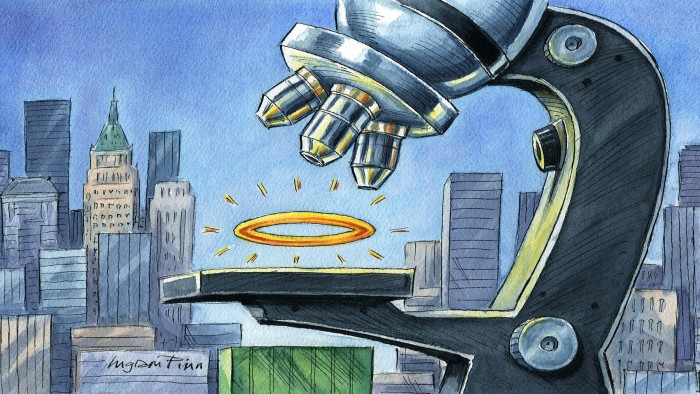Why ESG investing makes fund managers more money


Simply sign up to the ESG investing myFT Digest -- delivered directly to your inbox.
In recent years, some investors have felt so irritated by the pious tone of the environment, social and governance sector they have joked that the ESG acronym should stand for “eye-roll, sneer and groan”.
Such laughter is looking hollow now. Among the many long-held assumptions turned upside down by Covid-19 is the notion held by many investors that ESG investing implies lower returns. Instead, 2020 suggests that virtue pays.
Consider the first four months of this year, when Covid-19 caused global markets to swoon. Over this period, the S&P 500 ESG index, which tracks big US companies with high ESG ratings, beat the normal S&P index by 0.6 per cent.
Similarly, outside the US, MSCI’s emerging markets ESG leaders index, and its more Asia-focused AC Asia ESG leaders index, “outperformed their parent indices by 0.5 per cent and 3.83 per cent respectively,” notes the Asian Infrastructure Investment Bank in Beijing.
More striking still, BlackRock calculates that 88 per cent of “a globally-representative selection” of sustainable indices outperformed their non-sustainable peers over the same period. “Open-ended funds that score in the top 10 per cent on Morningstar’s sustainability ratings, significantly outperformed low-scoring peers,” it says in a new report.
Indeed, the pattern is so striking that Al Gore, the former US vice-president, tells the FT that “investors who do not recognise this new reality . . . are in serious danger of violating their fiduciary responsibility to their clients by leaving money on the table, and not taking into account factors that can actually improve performance of companies”.
This is cheering for ESG evangelists, particularly as BlackRock’s number-crunching suggests similar outperformance during the market downturns of 2015-16 and 2018. But investors need to ponder why this happened.
One temptingly easy answer is oil. ESG portfolios typically have low exposure to fossil fuel assets, for obvious environmental reasons. This shielded ESG portfolios when oil prices collapsed this year and energy stocks slumped. Yet the BlackRock boffins say their calculations show that such factors explain only “a fraction” of the sustainable funds’ outperformance.
Instead, they attribute it to two other issues. The first is momentum. As more investors buy ESG assets, that supports prices. In the first quarter of 2020, flows into global sustainable open-ended funds were 41 per cent higher year on year, BlackRock says.
The second and more thought-provoking reason is better supply chain management and corporate governance. To get high ESG ratings, companies usually need to audit their supply chains, employee practices and internal logistics, changing them where necessary. They must also prepare detailed ESG reports to comply with frameworks such as those of the Sustainability Accounting Standards Board.
Walmart is typical in this respect. Three years ago, when the company pledged to cut its carbon emissions by 18 per cent by 2025, it discovered that suppliers accounted for 90 per cent of them. So Walmart created a platform called Project Gigaton that constantly scrutinises its suppliers, said Kathleen McLaughlin, Walmart’s head of sustainability. The company is now working with 2,300 of its suppliers to cut a gigaton of carbon emissions by 2030.
Such corporate ESG initiatives may have an aspect of virtue-signalling. But they also have an additional, unintended, consequence: such forensic audits give companies the intimate information and supplier relationships needed to survive shocks like Covid-19.
Walmart officials say that the Project Gigaton platform has improved the company’s resilience in a much wider sense than “just” cutting carbon. As a joint report by State Street and Harvard Business School notes: “Firms that commit to their stakeholder relations provide a signal of resilience to investors, leading to less negative stock returns during the market collapse.”
Investors did not prioritise that “r” word — resilience — in the past when valuing stocks. But HSBC analysts think this is changing. Covid-19, geopolitical risks, political tumult and climate change have concentrated investors’ minds. “There’s some evidence that companies with long-term, sustainability focused strategies are weathering the consequences of the [Covid-19] disruptions better than those who have not,” HSBC says in a new report.
UK fast-fashion retailer Boohoo appears to have fallen into the latter camp. It was recently hit by claims that factories in Leicester that supply the online retailer had told staff to come into work during lockdown despite being sick. After its share price tumbled, Boohoo said it was “shocked and appalled by the recent allegations”, and launched an independent review of its supply chain.
Cynics may argue that self-interest and higher financial returns are at odds with goals such as saving the planet. The Covid-19 shock is also in its early days. We do not know if this outperformance will continue if there is a sustained global economic downturn; nor if companies will maintain “sustainability” pledges should bankruptcies soar.
Still, one rare silver lining of Covid-19 so far is that it has supported the investment case for ESG. That is especially welcome given that the pandemic may be a foretaste of what could happen under climate change.
Letter in response to this column:
Covid-19 has put fresh focus on ESG investing / From Andy Thompson, Worcester Park, Surrey, UK
Comments